高三英语语法复习名词
- 格式:doc
- 大小:45.50 KB
- 文档页数:10
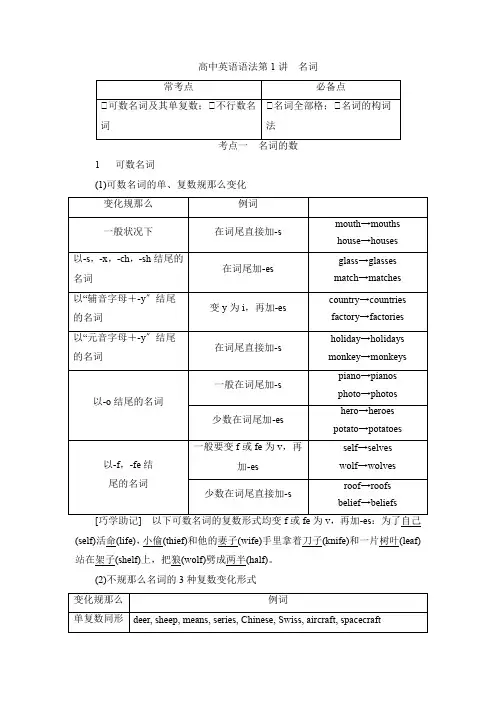
高中英语语法第1讲名词1 可数名词(1)可数名词的单、复数规那么变化:为了自己(self)活命(life),小偷(thief)和他的妻子(wife)手里拿着刀子(knife)和一片树叶(leaf)站在架子(shelf)上,把狼(wolf)劈成两半(half)。
(2)不规那么名词的3种复数变化形式一种鱼时,其单复数形式相同。
(2)people指“人们〞时单复数同形;指“民族〞时,其复数为peoples。
(3)合成名词的2种复数形式①假设有中心词,那么把中心词变成复数;假设无中心词,那么把最终一个词变成复数。
passerby→passersby, sisterinlaw→sistersinlaw, grownup→grownups①“man/woman+n.〞变复数时,作定语的man/woman和中心词都要变复数,如women engineers。
对点练1写出以下名词的复数形式①sheep—sheep①dish—dishes①knife—knives①story—stories①tomato—tomatoes2 不行数名词(1)常见的不行数名词一般来说,物质名词和抽象名词是不行数的,因此没有复数形式,一般也不能用a或an修饰。
通常只用作不行数的名词有:milk, music, homework, housework, weather, news, butter, information, bread, advice, progress, orange(橙汁), meat, equipment, fun, luggage, luck, work(工作), traffic, furniture, wealth, word(消息), room(空间), man(人类)等。
[名师点津]word意为“消息〞、room意为“空间〞、man意为“人类〞时,通常不带任何修饰词。
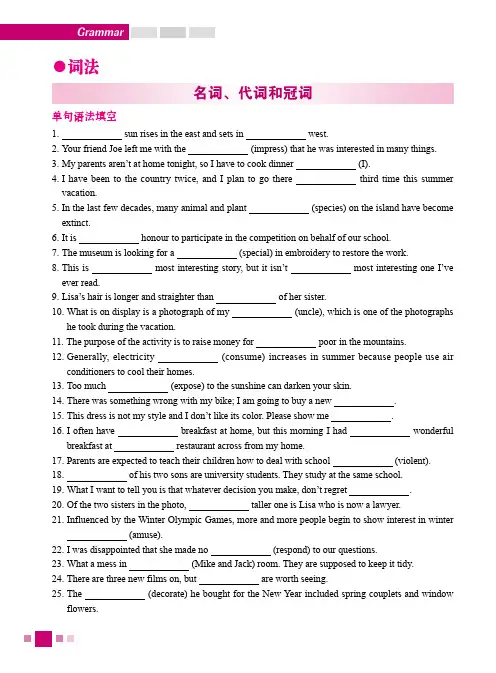
●词法名词、代词和冠词单句语法填空1. sun rises in the east and sets in west.2.Y our friend Joe left me with the (impress) that he was interested in many things.3.M y parents aren’t at home tonight, so I have to cook dinner (I).4.I have been to the country twice, and I plan to go there third time this summer vacation.5.I n the last few decades, many animal and plant (species) on the island have become extinct.6.I t is honour to participate in the competition on behalf of our school.7.T he museum is looking for a (special) in embroidery to restore the work.8.T his is most interesting story, but it isn’t most interesting one I’ve ever read.9.L isa’s hair is longer and straighter than of her sister.10.W hat is on display is a photograph of my (uncle), which is one of the photographshe took during the vacation.11.T he purpose of the activity is to raise money for poor in the mountains.12.G enerally, electricity (consume) increases in summer because people use airconditioners to cool their homes.13.T oo much (expose) to the sunshine can darken your skin.14.T here was something wrong with my bike; I am going to buy a new .15.T his dress is not my style and I don’t like its color. Please show me .16.I often have breakfast at home, but this morning I had wonderfulbreakfast at restaurant across from my home.17.P arents are expected to teach their children how to deal with school (violent).18. of his two sons are university students. They study at the same school.19.W hat I want to tell you is that whatever decision you make, don’t regret .20.O f the two sisters in the photo, taller one is Lisa who is now a lawyer.21.I nfluenced by the Winter Olympic Games, more and more people begin to show interest in winter (amuse).22.I was disappointed that she made no (respond) to our questions.23.W hat a mess in (Mike and Jack) room. They are supposed to keep it tidy.24.T here are three new films on, but are worth seeing.25.T he (decorate) he bought for the New Year included spring couplets and windowflowers.参考答案1. The; the2. impression3. myself4. a5. species6. an7. specialist8. a; the 9. that 10. uncle’s 11. the 12. consumption 13. exposure14. one 15. another 16. 不填; a; the 17. violence 18. Both19. it 20. the 21. amusements 22. response 23. Mike and Jack’s24. none 25. decorations— 7 —。
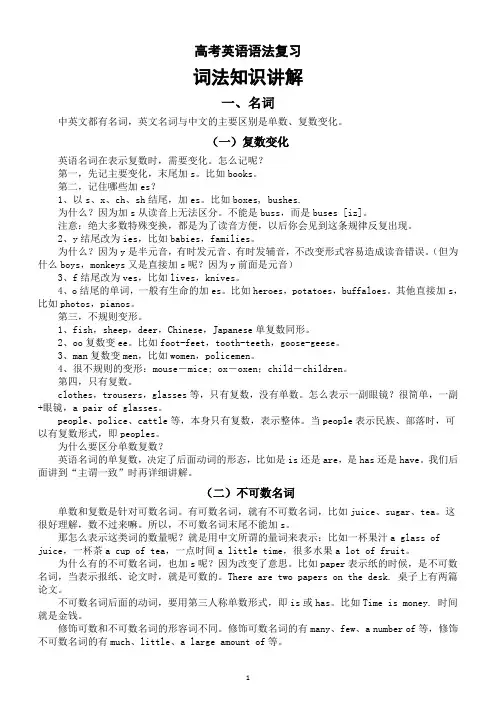
高考英语语法复习词法知识讲解一、名词中英文都有名词,英文名词与中文的主要区别是单数、复数变化。
(一)复数变化英语名词在表示复数时,需要变化。
怎么记呢?第一,先记主要变化,末尾加s。
比如books。
第二,记住哪些加es?1、以s、x、ch、sh结尾,加es。
比如boxes, bushes.为什么?因为加s从读音上无法区分。
不能是buss,而是buses [iz]。
注意:绝大多数特殊变换,都是为了读音方便,以后你会见到这条规律反复出现。
2、y结尾改为ies,比如babies,families。
为什么?因为y是半元音,有时发元音、有时发辅音,不改变形式容易造成读音错误。
(但为什么boys,monkeys又是直接加s呢?因为y前面是元音)3、f结尾改为ves,比如lives,knives。
4、o结尾的单词,一般有生命的加es。
比如heroes,potatoes,buffaloes。
其他直接加s,比如photos,pianos。
第三,不规则变形。
1、fish,sheep,deer,Chinese,Japanese单复数同形。
2、oo复数变ee。
比如foot-feet,tooth-teeth,goose-geese。
3、man复数变men,比如women,policemen。
4、很不规则的变形:mouse-mice; ox-oxen;child-children。
第四,只有复数。
clothes,trousers,glasses等,只有复数,没有单数。
怎么表示一副眼镜?很简单,一副+眼镜,a pair of glasses。
people、police、cattle等,本身只有复数,表示整体。
当people表示民族、部落时,可以有复数形式,即peoples。
为什么要区分单数复数?英语名词的单复数,决定了后面动词的形态,比如是is还是are,是has还是have。
我们后面讲到“主谓一致”时再详细讲解。
(二)不可数名词单数和复数是针对可数名词。
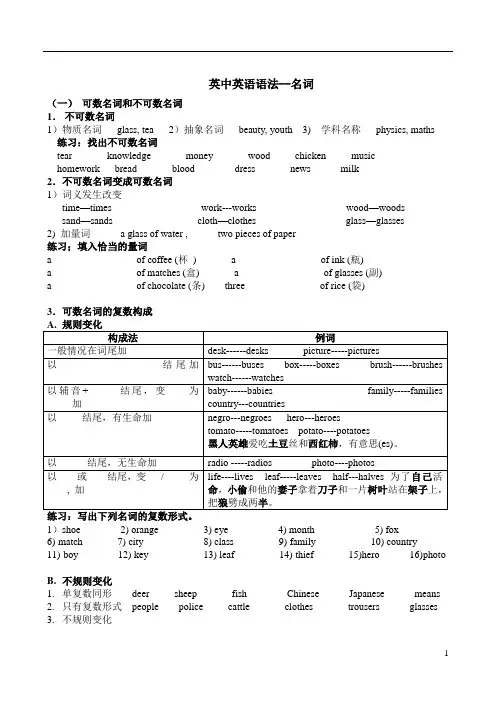
英中英语语法--名词(一)可数名词和不可数名词1.不可数名词1)物质名词glass, tea 2)抽象名词beauty, youth 3) 学科名称physics, maths 练习:找出不可数名词tear knowledge money wood chicken musichomework bread blood dress news milk2.不可数名词变成可数名词1)词义发生改变time—times work---works wood—woodssand—sands cloth—clothes glass—glasses2) 加量词 a glass of water , two pieces of paper练习;填入恰当的量词a ________________ of coffee (杯) a ________________ of ink (瓶)a ________________ of matches (盒) a ________________ of glasses (副)a ________________ of chocolate (条) three ______________ of rice (袋)3.可数名词的复数构成1)shoe 2) orange 3) eye 4) month 5) fox6)match 7) city 8) class 9) family 10) country11)boy 12) key 13) leaf 14) thief 15)hero 16)photoB.不规则变化1.单复数同形deer sheep fish Chinese Japanese means2.只有复数形式people police cattle clothes trousers glasses3.不规则变化man---- men woman---- women foot ----- feet tooth-----teeth mouse ------mice child-----children German------Germans4.复合名词的复数1)将后一部分变成复数Englishman---Englishmen gentleman---gentlemenpolicewoman----policewomen grown-up----grown-ups2)将主要成分变成复数looker-on----lookers-on son-in-law----sons-in-law3)如果前一词是man, woman,将两部分都变成复数men doctors women singers 练习:roof________ woman driver________________ step-mother_______________ sheep _____________ Japanese __________________ son-in-law_______________(二)名词所有格(表示所属、类别、动作的执行者或承受者)1.表示有生命的东西的名词,所有格在名词后加’sthe teacher’s praise the cat’s food James’ dog the do gs’ food2.表示无生命的东西的名词,用of+名词的结构来表示the leg of the desk the cover of the magazine3.在时间,距离,度量,价值等名词后,可用名词所有格。
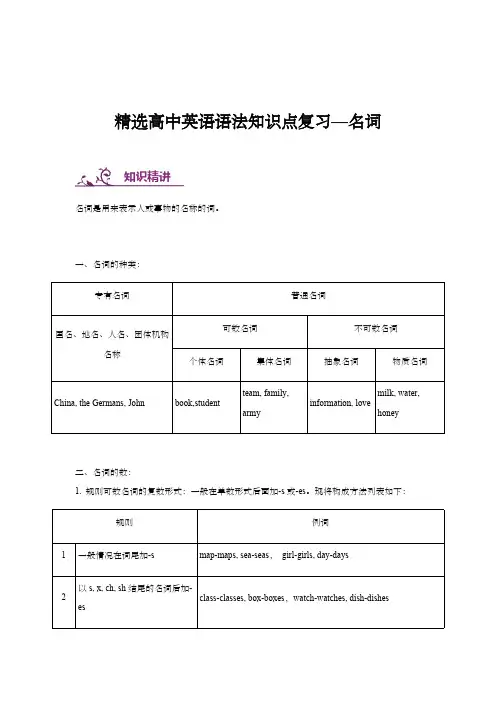

高中英语语法专题复习练习---名词一、单选题1.Tony said that she must feel very unhappy to say that. Claire thought it was ridiculous to be offered by a robot.A. scissorsB. sectionC. skinD. sympathy2.He graduated from a medical research ______ five years ago and has been working as a doctor since then.A. dataB. attendanceC. contextD. institute3.Now that the banks are back on their feet, we expect extraordinary ________ from them to help rebuild the economy.A. commitmentB. appointmentC. instrumentD. requirement4.The employer will bear 80% medical ______ for the employee during the employment period.A. discountB. fareC. feeD. fine5.The medicine should usually be kept out of the ________ of children at home.A. distanceB. reachC. limitD. arrival6.The of an area of land is a line in people's imagination that separates it from other areas.A. boundaryB. hurdleC. ceilingD. neighborhood7.Finding information in today's world is easy. The________ is how you can tell if the information you get is useful or not.A. knowledgeB. abilityC. competitionD. challenge8.The League member is brave, honest and hard-working. In a word, he is a good boy of many______.A. qualitiesB. principlesC. rewardsD. opinions9.Still a little left on the chair, seeing that, Grandma shouted to the little boy.A. bread, wasB. breads, wereC. bread, wereD. breads, was10.What Darwin said was an attack on people's religious .A. beliefB. beliefsC. beliefesD. believes11.Historic sites impress writers with their amazing beauty, which are a great source of ________.A. inspirationB. compositionC. occupationD. combination12.What is known to my families is that many are in my brother's album.A. stampB. stampsC. booksD. stampes13.The students didn't find much______ about the topic on the website.A. reportB. articleC. informationD. progress14.In universities in China, classes are often arranged in more flexible ___ and a lot of jobs areoffered to the students after graduation.A. patternsB. ranksC. gradesD. scales15.You will have more success if you study regularly, so try to develop a ________.A. theoryB. stormC. routineD. project16.For years,scientists have been worried about the________of air pollution on the earth'snatural conditions.A. effectB. resultC. accountD. cause17.How amazing it is that Zuckberg can speak Chinese! After all, it is a big_____ for anywesterner to learn such a totally different language.A. adventureB. achievementC. trendD. challenge18.Thanks to the special chemical ________ of the soil in the mountainous area, this economicplant grows well there.A. compositionB. competenceC. constructionD. conclusion19.Every great accomplishment rests on the of what came before it; when you trace it back, you'll see one small step that started it all.A. reputationB. expectationC. recreationD. foundation20.Saving Private Ryan is an unforgettable anti-war film and also a story of courage and_________.A. burdenB. depressionC. benefitD. sacrifice21.The lack of eco-friendly habits among the public is thought to be a major _____________ of global climate change.A. resultB. causeC. warningD. reflection22.—Whose umbrella is it?—It's ________.A. somebody else'sB. Somebody elseC. Somebody's else'sD. Somebody's else23.An important component of any trip to a ______ you haven't visited is a map.A. destinationB. dimensionC. dictationD. distinction24."May I take your order now?" "We'd like three black _______ and two green _______."A. coffee, cups of teasB. coffees, teasC. cups of coffee, teaD. cup of coffees, teas25.The rising crime is a major_______ of society.A. responsibilityB. conditionC. causeD. concern26.When I came back home, I wrote him a letter to show my ________ of his thoughtfulness.A. appreciationB. agreementC. attentionD. achievement27.The weather forecast says it will be cloudy with a slight _____ of rain later tonight.A. effectB. senseC. changeD. chance28.He sold this car for only 2000 dollars, so the buyer got a wonderful________.A. costB. worthC. valueD. bargain29.Excuse me, can you change this for me?A. five-pound noteB. five pound noteC. five-pound notesD. five pounds notes30.People with simple names enjoy quicker career advancement because names which are hard to pronounce inspire negative _______ from superiors.A. considerationB. consequencesC. expectationsD. reactions31.Take it easy. As your best friend, I will help you in my ________.A. powerB. forceC. energyD. strength32.Only when women are enabled to become strong will our families, our economies, and our societies reach their fullest .A. distinctionB. innovationC. potentialD. appreciation33.I practiced a lot in the training center so that I could pass the driving test at my first__________ .A. attemptB. experimentC. flightD. glance34.I asked her if she would attend Barbara's party to be held the next week, but she made no______.A. responseB. explanationC. conceptD. affection35.When I turned back, I noticed again there was no _________of him in the mirror.A. pictureB. shadowC. reflectionD. figure36.—Could you tell me the____ of making such tasty cakes?— Well, I just follow the directions in the cookbook.A. featureB. planC. costD. trick37.If people find out what you are doing here, it will completely ruin your________.A. fortuneB. chanceC. destinationD. reputation38.He wanted to look for a(n) _________suited to his abilities.A. pensionB. preventionC. occupationD. permission39.In order to _______ a good knowledge of English, he gave up his job and went to study in an English school.A. requireB. inquireC. acquireD. address40.Judging from her _________, I guess she must come from the West of America.A. voiceB. soundC. noiseD. accent41.The ______ is the degree to which something is good or bad.A. qualityB. quantityC. scale42.Male nurses are difficult to hire as many men reject this______ out of the long-existing discrimination.A. conceptB. responsibilityC. identityD. personality43.Have you heard the traffic ________that happened in Yatai Street last week?A. accidentB. affairC. incidentD. event二、语法填空44.We paid a visit to Guilin, whose beauty was beyond ________ (describe).45.The cinema has little________ (attract) for some people.46.Some students hold the view that universities should be centers of ________ (cultural).47.The Intelligent Transport team at Newcastle University have turned an electric car into a mobile laboratory named “DriveLAB” in order to understand the ________ (challenge) faced by older drivers and to discover where the key stress points are.48.Good books are of great ________ (valuable) to students.5答案一、单选题1.【答案】D【解析】【分析】本题考查名词的词义辨析。
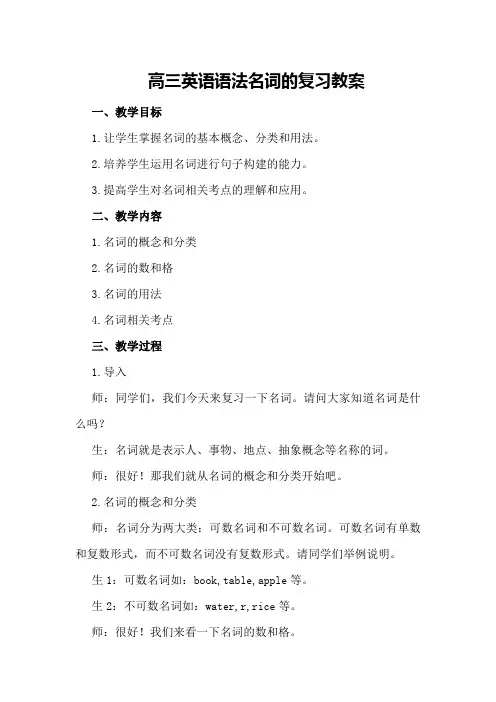
高三英语语法名词的复习教案一、教学目标1.让学生掌握名词的基本概念、分类和用法。
2.培养学生运用名词进行句子构建的能力。
3.提高学生对名词相关考点的理解和应用。
二、教学内容1.名词的概念和分类2.名词的数和格3.名词的用法4.名词相关考点三、教学过程1.导入师:同学们,我们今天来复习一下名词。
请问大家知道名词是什么吗?生:名词就是表示人、事物、地点、抽象概念等名称的词。
师:很好!那我们就从名词的概念和分类开始吧。
2.名词的概念和分类师:名词分为两大类:可数名词和不可数名词。
可数名词有单数和复数形式,而不可数名词没有复数形式。
请同学们举例说明。
生1:可数名词如:book,table,apple等。
生2:不可数名词如:water,r,rice等。
师:很好!我们来看一下名词的数和格。
3.名词的数和格师:名词的数分为单数和复数。
单数名词通常加“-s”或“-es”变为复数。
但有些名词变复数时需要特殊变化,比如:childchildren,manmen等。
名词的格分为三种:主格、宾格和属格。
主格用于名词作主语,宾格用于名词作宾语,属格用于表示所有关系。
师:请同学们用所学的名词,分别构成单数和复数形式,并说明其格。
生1:bookbooks(主格:Thebookisonthetable.宾格:Ilikethisbook.属格:Thisismybook.)生2:childchildren(主格:Thechildrenareplaying.宾格:Iseethechildren.属格:Thechildren'sbooksarehere.)4.名词的用法师:名词在句子中的用法有很多,比如作主语、宾语、表语、定语等。
请同学们用所学的名词,分别构成不同成分的句子。
生1:主语:Thecatissleeping.生2:宾语:Iboughtabook.生3:表语:Sheisateacher.生4:定语:Thegirl'sbagisred.5.名词相关考点师:在高考英语中,名词的考点主要包括名词的单复数、格、所有格、同义词辨析等。
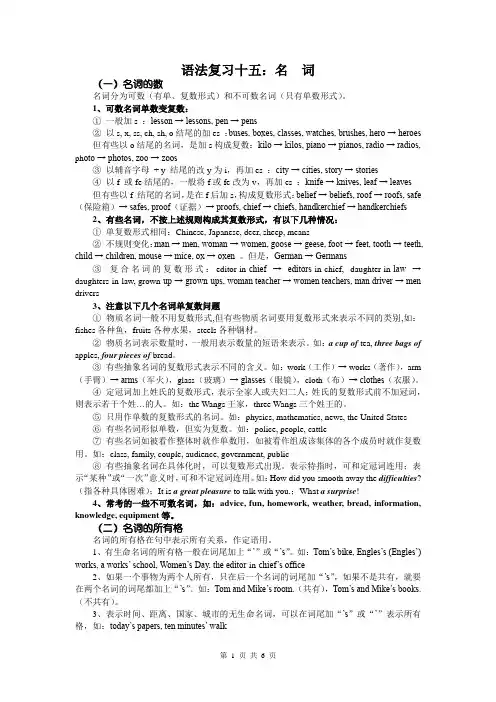
语法复习十五:名词(一)名词的数名词分为可数(有单、复数形式)和不可数名词(只有单数形式)。
1、可数名词单数变复数:①一般加s :lesson → lessons, pen → pens②以s, x, ss, ch, sh, o结尾的加es :buses, boxes, classes, watches, brushes, hero → heroes但有些以o结尾的名词,是加s构成复数:kilo → kilos, piano → pianos, radio → radios, ph oto → photos, zoo → zoos③以辅音字母+ y 结尾的改y为i,再加es :city → cities, story → stories④以f 或fe结尾的,一般将f或fe改为v,再加es :knife → knives, leaf → leaves但有些以f 结尾的名词,是在f后加s,构成复数形式:belief → beliefs, roof → roofs, safe (保险箱)→ safes, proof(证据)→ proofs, chief → chiefs, handkerchief → handkerchiefs2、有些名词,不按上述规则构成其复数形式,有以下几种情况:①单复数形式相同:Chinese, Japanese, deer, sheep, means②不规则变化:man → men, woman → women, goose → geese, foot → feet, tooth → teeth, child → children, mouse → mice, ox → oxen。
但是,German → Germans③复合名词的复数形式:editor-in-chief → editors-in-chief, daughter-in-law → daughters-in-law, grown-up → grown-ups, woman teacher → women teachers, man driver → men drivers3、注意以下几个名词单复数问题①物质名词一般不用复数形式,但有些物质名词要用复数形式来表示不同的类别,如:fishes各种鱼,fruits各种水果,steels各种钢材。
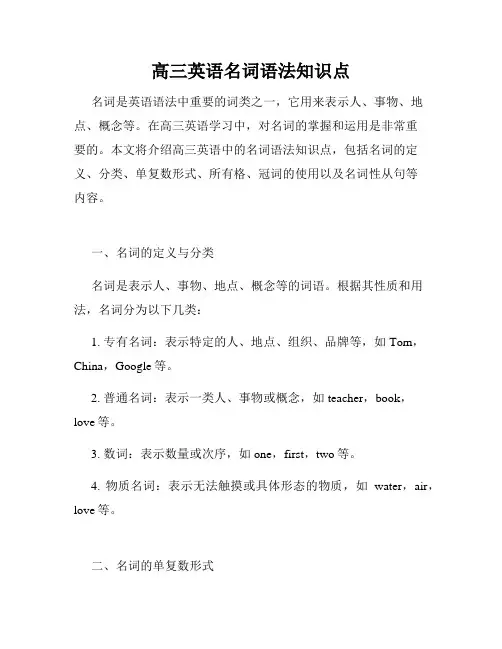
高三英语名词语法知识点名词是英语语法中重要的词类之一,它用来表示人、事物、地点、概念等。
在高三英语学习中,对名词的掌握和运用是非常重要的。
本文将介绍高三英语中的名词语法知识点,包括名词的定义、分类、单复数形式、所有格、冠词的使用以及名词性从句等内容。
一、名词的定义与分类名词是表示人、事物、地点、概念等的词语。
根据其性质和用法,名词分为以下几类:1. 专有名词:表示特定的人、地点、组织、品牌等,如Tom,China,Google等。
2. 普通名词:表示一类人、事物或概念,如teacher,book,love等。
3. 数词:表示数量或次序,如one,first,two等。
4. 物质名词:表示无法触摸或具体形态的物质,如water,air,love等。
二、名词的单复数形式名词有单数和复数形式,单数表示一个,复数表示多个。
一般情况下,名词的复数形式在词尾加-s或-es,但也有一些规则变化的例外。
以下是一些常见的名词复数形式变化规则:1. 一般情况下,在名词词尾加-s,如books,tables等。
2. 以-s,-ss,-sh,-ch,-x,-o结尾的名词,要在词尾加-es,如boxes,glasses,wishes等。
3. 以辅音字母+y结尾的名词,要将-y变为-i,再加-es,如babies,berries等。
4. 以-f或-fe结尾的名词,要将-f或-fe变为-ves,如leaves,knives等。
三、名词的所有格名词的所有格用来表示所属关系或所拥有的关系。
一般情况下,在名词的后面加-apostrophe+s 's,表示单数所有格,如Tom's book,Lucy's bag等。
对于以-s结尾的名词复数,只需在词尾加-apostrophe ',表示复数所有格,如the students' books,the boys'toys等。
四、冠词的使用冠词是用来限定名词的词语,分为不定冠词a/an和定冠词the。
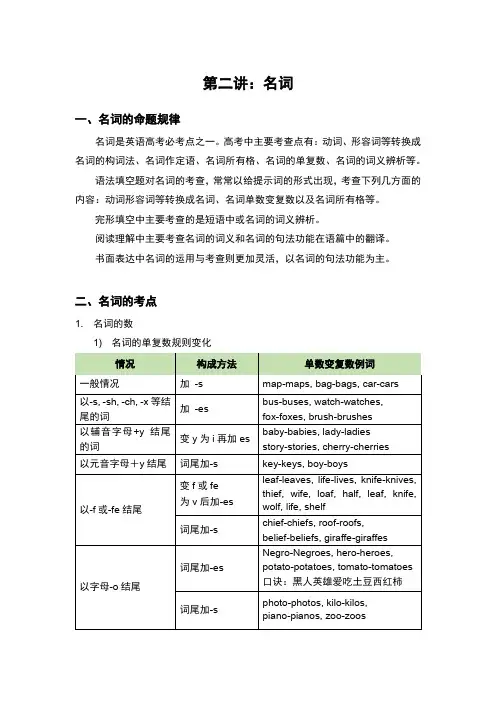
第二讲:名词一、名词的命题规律名词是英语高考必考点之一。
高考中主要考查点有:动词、形容词等转换成名词的构词法、名词作定语、名词所有格、名词的单复数、名词的词义辨析等。
语法填空题对名词的考查,常常以给提示词的形式出现,考查下列几方面的内容:动词形容词等转换成名词、名词单数变复数以及名词所有格等。
完形填空中主要考查的是短语中或名词的词义辨析。
阅读理解中主要考查名词的词义和名词的句法功能在语篇中的翻译。
书面表达中名词的运用与考查则更加灵活,以名词的句法功能为主。
二、名词的考点1. 名词的数1) 名词的单复数规则变化2) 名词的单复数不规则变化易错点:与man 和woman构成的合成词,其复数形式也是-men 和-women。
如:two Englishmen。
但German和human不是合成词,故复数形式为Germans和humans。
3) 复合名词变复数✧复合名词变复数时,通常只将其中的主体名词变成复数。
bedroom→bedrooms卧室looker-on→lookers-on旁观者passer-by→passers-by过路人editor-in-chief→editors-in-chief总编daughter-in-law→daughters-in-law儿媳妇✧如果没有主体名词,则将最后一部分变成复数。
go-between→go-betweens中间人look-out→look-outs守望者grown-up→grown-ups成年人✧易错点:man/woman+名词变复数时,作定语的man/woman和后面的名词都要变成复数形式,如a man doctor→two men doctors4) 集体名词,以单数形式出现,表达复数含义✧如:people; police; cattle 等本身就是复数,不能说a people,apolice,a cattle,但可以说a person, a policeman, a head of cattle.✧the English, the British, the French, the Chinese, the Japanese, theSwiss 等名词,表示国民总称时,作复数用。
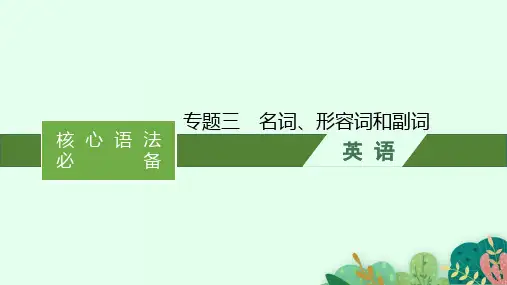
高中英语语法复习天津市汉沽区第五中学刘华名词专有名词(Proper Nouns)普通名词(Common Nouns)个体名词(Individual Nouns)集体名词(Collective Nouns)物质名词(Material Nouns)抽象名词(Abstract Nouns)不可数名词(Uncountable Nouns)可数名词(Countable Nouns)Proper Nouns:指人名、地名及某些人和事物专有的名称Tom; Beijing; Americans;English; May; New Year’s Day 注意:专有名词的第一个字母要大写Common Nouns:专有名词以外的名词都是普通名词1。
Individual Nouns:指作为个体而存在的人或东西。
可以指具体的人或物。
aunts; a panda; apartments也可指抽象东西。
a year; fairy tales; a dream2. Collective Nouns:表示由个体组成的集体。
army; audience; crew; family; team;police; government; public集体名词有时作单数看待,有时作复数看。
一般来说,视为整体时作单数看,突出它的成员时作复数看。
His family isn’t large.His family are all music lovers.在不少情况下,集体名词后单复数动词都可以用,没什么差别。
The audience was (were) excited by the show.3.Material Nouns:指无法分为个体的东西。
beer; cake; cloth; cotton; detergent; fur; ice; paint; paper; soil一般来说,物质名词是不可数的,因而没有复数形式。
但有一些特殊情况:1)有些物质名词可用作可数名词,表示“一份”、“一杯”、“一种”Two strong black coffees, please.( 两份)Three beers, please.(三杯)It was a special tea.(一种)2)个别物质名词的复数形式可以表示特别的意义。
高三英语语法讲解及练习动名词第一部分知识透析第一节动名词的基本形式主动被动1. 一般式(not) doing(not) being done(常用来泛指一个动作,没有特别的时间意义,有时也可以表示在谓语动词之前或之后发生的动作)Swimming is her favorite sport.Learning to use electronic products is necessary in modern society.I remembered sending him an e-mail last week.He suggested taking my daughter to the zoo the next Sunday.I can’t stand being kept waiting.His not coming made everyone very disappointed.2. 完成式(not) having done(not) having been done(动名词的动作在谓语动词的动作之前发生)1 really regretted having missed such a wonderful musical.He denied having cheated in the exam.I heard of his having been chosen to be the coach of the team.I remember not having returned the book to the library.第二节动名词的用法1. 动名词作主语/表语动名词作主语/表语表示泛指的经常性的事情Collecting information is very important to businessmen.My hobby is collecting stamps.One of my bad habits is biting nails.2. 动名词作宾语1)一些动词后面只能跟动名词作宾语,如:ban consider delay deny escapefeel like finish forbid involve appreciatekeep practise recommend quit suggestadmit permit avoid enjoy mentionimagine include mind miss resistRisk prohibit allow advise encouragedislike forgive advocate postpone fancyHe denied having been there.We enjoy walking along the Bund.Don’t risk going to the forest alone.The old should avoid eating oily food.注意:allow, advise,encourage,forbid, permit,recommend 后接动名词作宾语,接不定式作补语。
高考英语基础语法考点整理一、名词1.特殊名词的复数:child-children, man-men, woman-women, foot-feet, tooth-teeth,mouse-mice,sheep-sheep, species-species, stomach-stomachs, deer-deer,goose-geese,ox-oxen, Chinese-Chinese, Japanese-Japanese, phenomenon-phenomena,means-means,series-series, crisis-crises, basis-bases, German-Germans,Australian-Australians2.不可数名词:advice, baggage, equipment, information, luggage, furniture, fun, weather,knowledge, jewelry, progress, traffic3.可数不可数均可,但意思不同arm手臂,arms武器good好处,goods货物green绿色, greens蔬菜paper纸, papers论文sand沙, sands沙滩time时间, times时代water水,waters水域wood木材, woods森林work工作, works著作experience经验, experiences经历room空间, rooms房间exercise锻炼, exercises 练习4.只有复数形式的名词trousers, clothes, socks, shorts, goods, thanks,congratulations, belongings, scissors, glasses, wages工资;riches财富;surroundings环境;ashes灰尘;compasses圆规5.复数形式,单数意思的名词plastics, news, politics, physics, mathematics6.复合名词的复数形式:girl-friends, boy-students, women-teachers, men-workers, passers-by,go-betweens, grown-ups7.谓语动词用复数的名词police,cattle, clothes, goods8.抽象名词具体化为可数名词surprise, cold, pleasure, pity, failure, success, worry, honor, must,difficulty, youth, beauty, wonder, danger, interest9.辅音字母+o结尾复数加-es的名词tomato-tomatoes, potato-potatoes, hero-heroes10.变“f”或“fe”为“v”之后再加-es为复数形式的名词wife-wives, life-lives, knife-knives, wolf-wolves, self-selves,leaf-leaves,shelf-shelves, thief- thieves11.特殊注意的名词people (民族,人)nature (自然,特性)man(男人,人类),youth (年轻人,青年男子,青春)12.特殊注意的搭配congratulations祝贺have words with sb. 同某人吵架in high spirits以很高热情地give one’s regards to sb.向某人问侯in rags衣衫破烂It is good manners to do sth.有礼貌做某事二、动词时态和语态1.常考动词时态(1)三个一般:一般现在时、一般过去式、一般将来时;(2)三个现在:现在进行时、现在完成时、现在完成进行时;(3)三个过去:过去进行时、过去完成时,过去完成进行时。
语法复习:名词一、名词的分类:名词就其词汇意义可分为专有名词和普通名词。
普通名词又可分为可数名词和不可数名词。
专有名词个体名词名词可数名词集合名词普通名词物质名词不可数名词抽象名词二、概念:名词:表示人、事物或抽象概念的名称。
专有名词:表示个人、地方、团体、机构、节日等专用的名称。
如:Beijing, Smith, the Summer Palace, the United States, the Second World War, May Day。
单个的专有名词第一个字母大写,由普通名词构成的专有名词,前面有定冠词the,后面的每个单词第一个字母大写。
普通名词:表示同属一类的人或事物,或某种物质或抽象概念的名称。
可数名词:(缩写为[C])可以用数目来计数的名词。
可以用基数词修饰,也可用many,a good / great many, a number of, few, a few, several等词修饰。
个体名词:表示同属一类的人或事物中的个体。
如:student, tree, chair, car, book。
个体名词在句中时前面必须有限定词(如the, my, this等)。
集合名词:(又称为集体名词)表示一群人或一类事物。
如:army, class, committee, fruit, police不可数名词:(缩写为[U])不可以用数目来计数的名词。
不可用基数词直接修饰。
物质名词:表示物质或无法分为个体的东西。
如:iron, cotton, fire, water。
它们需要用单位名词来衡量,如:a piece of bread, a cup of water抽象名词:表示抽象概念的名词。
如:happiness, education, labour, love【注1】对于单个单词来说,它既可能是可数名词,也可能是不可数名词。
如:many rooms (很多房间)---much room(大量空间);rubber(橡胶)---two rubbers(两块橡皮);iron(铁)--- an iron(一只熨斗);glass(玻璃)--- a glass(一个玻璃杯);wood(木头)--- a woods(一片树林);paper(纸)--- a paper(一份报纸、文件)【注2】请牢记下列典型的不可数名词及词义。
advice 忠告,建议baggage / luggage 行李change零钱cloth布clothing 衣物equipment 设备English 英语furniture 家具fun 乐趣knowledge 知识information 信息music音乐news 消息progress 进步traffic 交通,车辆weather天气wealth 财富damage 损坏work 工作word 消息,信息homework 家庭作业housework 家务poetry诗歌(总称)machinery(机器设备);jewellery珠宝(总称);clothing衣物(总称)【注3】部分抽象名词可与a(an)连用,此时词义发生变化。
如:surprise(一件令人惊讶的事), pleasure(一件让人愉悦的事), honour(一件荣幸的事), help(一个助手), success(一件成功的事/一个成功的人),a heavy rain(一场大雨),two coffees(两份咖啡),a long time(一段很长的时间),two deaths(两个死亡的人)。
三、名词的数:可数名词有单数和复数两种形式。
可数名词复数的规则变化有以下情况:1.一般情况,直接加-s: e.g. port---ports,technique---techniques,hen---hens, hat---hats2.以s, x, ch, sh结尾发[s]、[∫]、[t∫]、[dЗ]音的词,加—es:e.g. bus—buses, box—boxes, bush—bushes, branch—branches,注:stomach—stomachs(stomach词尾发/k/,故复数直接加-s)3.辅音字母+ y,变y为i,加-es:e.g. university—universities, city---cities, story--- stories元音字母+ y,直接加-s: e.g. boy—boys, day---days特例:Henry(亨利)---Henrys, Mary--- Marys, stand-by(备用的人或物)---stand-bys, penny(便士)---pennies / pence4.以o结尾加-es: e.g. Negro—Negroes,hero—heroes, tomato—tomatoes,potato—potatoes, volcano---volcanoes, mosquito(蚊子)---mosquitoes, echo(回音)---echoes加-s: e.g.zoo—zoos, kangaroo---kangaroos, studio---studios,radio—radios, piano—pianos, photo—photos,bamboo---bamboos, hippo(河马)---hippos,tobacco(烟叶)---tobaccos, kilo(千克)---kilos, auto(汽车)--autos特例:motto(座右铭,箴言)---mottos / mottoes,zero---zeros / zeroes5.以f或fe结尾,变f或fe为v,再加-es:e.g. leaf—leaves, wife—wives, thief---thieves, half---halves特例:belief—beliefs, roof—roofs, proof—proofs, safe—safes(保险柜),cliff(悬崖)---cliffschief—chiefs,gulf—gulfs(海湾), serf(农奴)--serfs, staff(工作人员)---staffs, cafe(咖啡馆)---cafes, grief(悲痛的事)---griefshandkerchief(手帕)--- handkerchiefs / handkerchieves, scarf(围巾)--- scarfs / scarves,6. 字母、数字、缩写词以及引语的复数:e.g. There are three a’s in the word banana. 在banana这个单词中有三个a。
The war broke out in the 1940’s / 1940s. 战争爆发于二十世纪四十年代。
He always speaks politely, full of madam’s and if I may ask a question’s. 他说话很有礼貌,话语里尽是“太太”和“如果我可以提一个问题的话”。
He left out two 4’s in that number. 他在那个数字中漏了两个4。
You used too many that’s in your speech. 在演讲中你用了太多的that。
pp. (= pages),Exx. 3,4 and 5 练习3、4、5,ll. 2 and 3 第2、3行,Dr.(doctor)---Drs., hr.(hour)--- hrs, yr.(year)---yrs, many VIP’s/ VIPs 很多重要人物,three Ph D’s三个哲学博士而有些度量单位的缩写词,往往不加s:ft. (foot), kg. (kilogramme), km. (kilometre), m. (metre), min. (minute), sec. (second) 7. 复合名词的复数:1)在主体名词上变复数:comrade-in-arms(战友)---comrades-in-arms, passer-by(过路人)---passers-bydaughter-in-law(媳妇)---daughters-in-law, editor-in-chief(总编辑)---editors-in-chief, looker-on(旁观者)---lookers-on2)复合名词由两个主体名词构成时,在后一个词上变复数:assistant professor(助教)---assistant professors, pencil box---pencil boxes, dining-room---dining-rooms, girl friend---girl friends, shoe shop---shoe shops,grown-up(成年人)---grown-ups,stand-by(可靠的人)---stand-bys3)复合词中有man, woman两词时,两个都变复数:man doctor--- men doctors,woman teacher --- women teachers但man, woman位于复合词之后时,只将man, woman变复数:policeman---policemen8.不规则的名词复数形式:man—men, woman—women, policeman---policemen, gentleman---gentlemen, German (德国人)---Germans, Roman(罗马人)---Romans, foot—feet, tooth—teeth,goose—geese, mouse—mice, child—children, ox—oxen,phenomenon(现象)---phenomena, criterion(评判标准)---criteria, crisis(危机)---crises,analysis(分析)---analyses, basis(基础)---bases, bacterium(细菌)--bacteria【注1】有些可数名词的单复数相同,要根据上下文的意义来确定其单数还是复数,例如:sheep 羊, deer 鹿;fish 鱼(作不同种类的“鱼”解时,有复数形式:fishes),duck 鸭(作“家鸭”解时,有复数形式:ducks);data(资料,数据);aircraft(飞机);means手段,方法works工厂;作品series系列;crossroads(十字路口);Chinese (中国人);Japanese(日本人);Swiss(瑞士人);jin(斤);mu(亩);li(里);yuan(元);【注2】有些集合名词,是单形复念(即单数形式复数意义),如果作主语,谓语动词用复数形式。